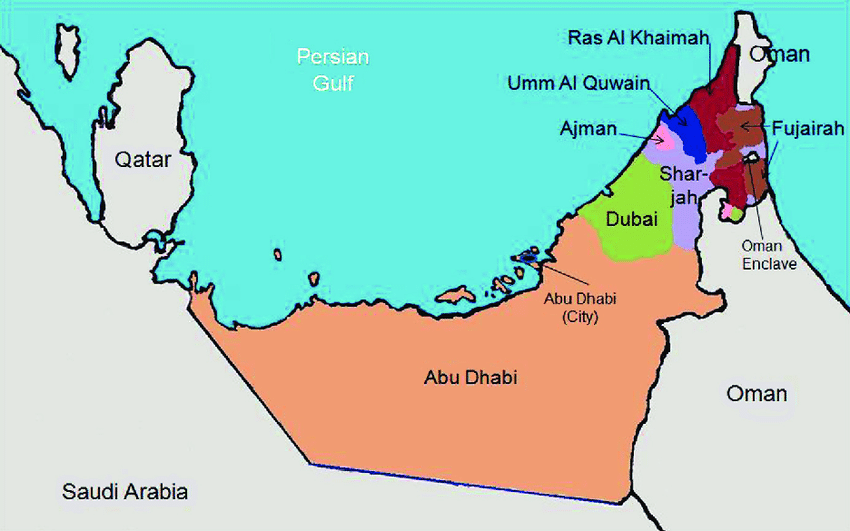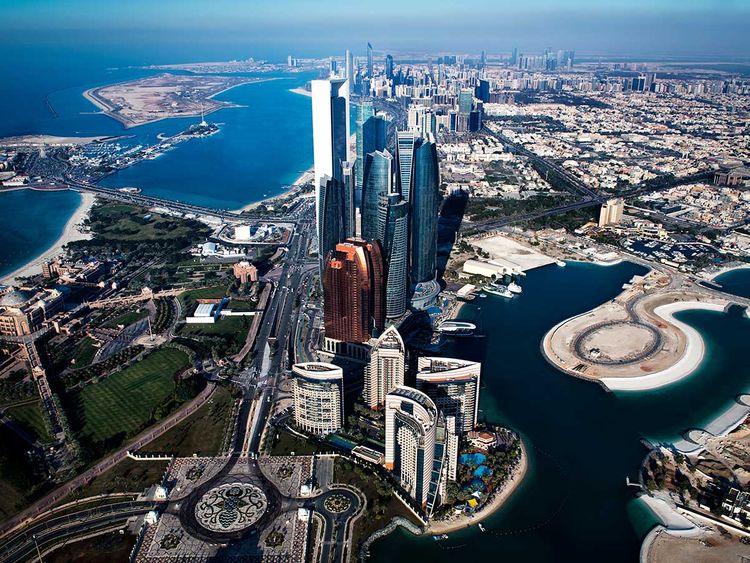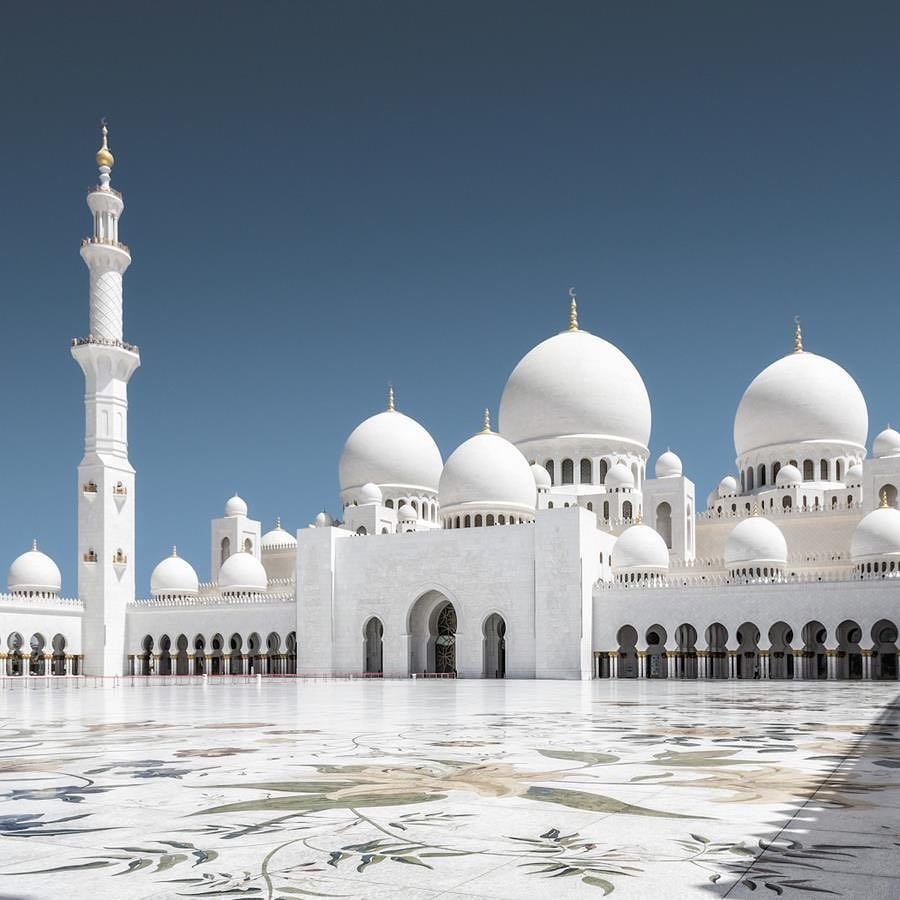I didn’t know where it was then, but I later learned that Abu Dhabi is in the United Arab Emirates (often just abbreviated as UAE). The name is fairly self-explanatory, but it comes from the fact that they were originally the seven emirates of Abu Dhabi, Ajman, Dubai, Fujairah, Ras Al Khaimah, Sharjah, and Umm Al Quwain. An emirate is a territory ruled by an emir.
The United Arab Emirates are located on the Arabian Peninsula, surrounded by Saudia Arabia to the west and south, and Oman to the east. The part of land that sticks out into the Strait of Hormuz actually belongs to Oman, and there’s also a small enclave in the Fujairah Emirate that belongs to Oman, but within that enclave there’s another enclave that belongs to the UAE which is the Sharjah Emirate. Enclaves on enclaves on enclaves. The UAE borders the Persian Gulf, directly across from Iran. It’s pretty hot here most of the year, although it’s cooler in the mountains. The western part of the country is mostly sand and desert that blends in with the Rub al-Khali desert in Saudi Arabia.
 |
| Zayed bin Sultan Al Nahyan, the first president of the UAE |
The Arabian Peninsula was originally part of the African continent and its first people were thought to have been part of the Bantu migration. Communities started popping up along the coastal areas and began trading with each other. The creation and spread of Islam had a significant impact on this area. While the cities were mainly located along the coasts, there were huge groups of nomads moving throughout the interior, and many times these nomadic groups would clash. At the same time, several European powers were expanding in this area, and the Portuguese had a pretty good hold along the Persian Gulf. The British got involved to protect their role in the Indian trade routes, which led to conflicts and a truce that resulted in the creation of the Trucial States that then became a British protectorate. Throughout much of the 1800s and 1900s, pearling was a major industry. At one point, Persian Gulf pearls were some of the most coveted pearls in the world, and it was a major source of their income. However, between WWI and the economic collapse afterwards, it completely wiped out the industry. The discovery of oil swept in and took its place, and the British told them they couldn’t sign any deals with other countries (because of course they did). The British company that eventually became BP [British Petroleum] started setting up drilling sites. Other companies popped up practically overnight, and one of the first major holes drilled resulted in a dud, costing the company a ton of money. With so many companies vying for oil in the Gulf, it led to quite a few arguments over territorial rights, including border disputes between the UAE and Oman. They finally struck oil (or as it was called in the Beverly Hillbillies: “black gold, Texas tea”). The British couldn’t afford to keep the UAE as a protectorate anymore, and they declared them as independent, even though the Emiratis had a lot of concerns about being out there on their own for good reason. An Iranian destroyer ship took over some islands that belonged to the UAE while a British ship sat there and watched. Saudi Arabia had its eyes on parts of Abu Dhabi and claimed it as theirs. But in 1971, they were officially their own country. Since then, the UAE has supported several military operations throughout the region. Their first national elections were held in 2006, although they’ve escaped much of the Arab Spring that several other countries dealt with.
Abu Dhabi may be the capital, but it’s not the largest city in the UAE. That honor goes to Dubai, an important port city but also known for its extravagant shopping. The city was supposed to hold a huge Expo this year that lasts six months, but it was moved to next year because of Covid. More centrally located, the city of Abu Dhabi is also an important port city. Literally meaning “father of the gazelle,” the city was founded in 1761 when the Bani Yas bedouin tribe settled on the island of Abu Dhabi. What started as a center for pearling changed over to oil. It started to grow in major ways in the late 1960s to become the financial and commerce center with its iconic skyscrapers it’s known for today. The city is also recognized for the Red Bull Air Race World Series, Abu Dhabi Grand Prix, and as the scenery for many Hollywood and Bollywood movies.
The UAE has the second-largest economy among the Arabian Peninsula countries after Saudia Arabia. It’s highly driven by oil, and foreign workers who arrived helped boost their growth. The country also ranks fairly high for doing business and also strongly depends on financial business, construction, professional services, and tourism. The Emirates airline is the 4th largest airline in the world, with the Dubai Airport ranking as the busiest airport in the world in 2014. If you’re a fan of sports, you may have seen the Emirates logo on shirts and stadiums since they’re the title sponsor for several teams in cricket, soccer/football, Formula One and other racing sports, rugby, tennis, baseball, cycling, and sailing.
Islam has been declared as the state religion, but they do allow tolerance for other religions. Although nearly ¾ of the population are Muslim (vastly Sunni), there are significant followers of Christianity, Hinduism, Buddhism, and others. And even though they typically don’t meddle in what you choose to believe, they are quite adamant about actively spreading your religion, and they do uphold its citizens and visitors to a strict social code of acceptable public (and private) behaviors.
Arabic is spoken throughout the United Arab Emirates, and more specifically the Gulf dialect. However, because the British held it as a protectorate for so long, English is also used quite a bit, and mainly as a lingua franca (which probably explains why the Bugs Bunny show I mentioned earlier was in English).
One thing that’s hard to ignore is the issue of human rights in the UAE. Quite a few organizations have the country in their sights for reports of forced disappearances, torture, sexual abuse, using overly aggresive punishments (electric shocks, flogging, stoning, beatings), among other issues -- and this goes for their own citizens and visitors alike. Some of the biggest offences are things that don’t receive as harsh punishment in most other countries, like public affection, public intoxication, drugs, or homosexuality. The UAE is listed on many reports as being “not free” when it comes to censorship and freedom of their people to express themselves. But as with every country, I’m sure there are some redeeming qualities, and I’m looking forward to finding them.
Up next: art and literature







No comments:
Post a Comment